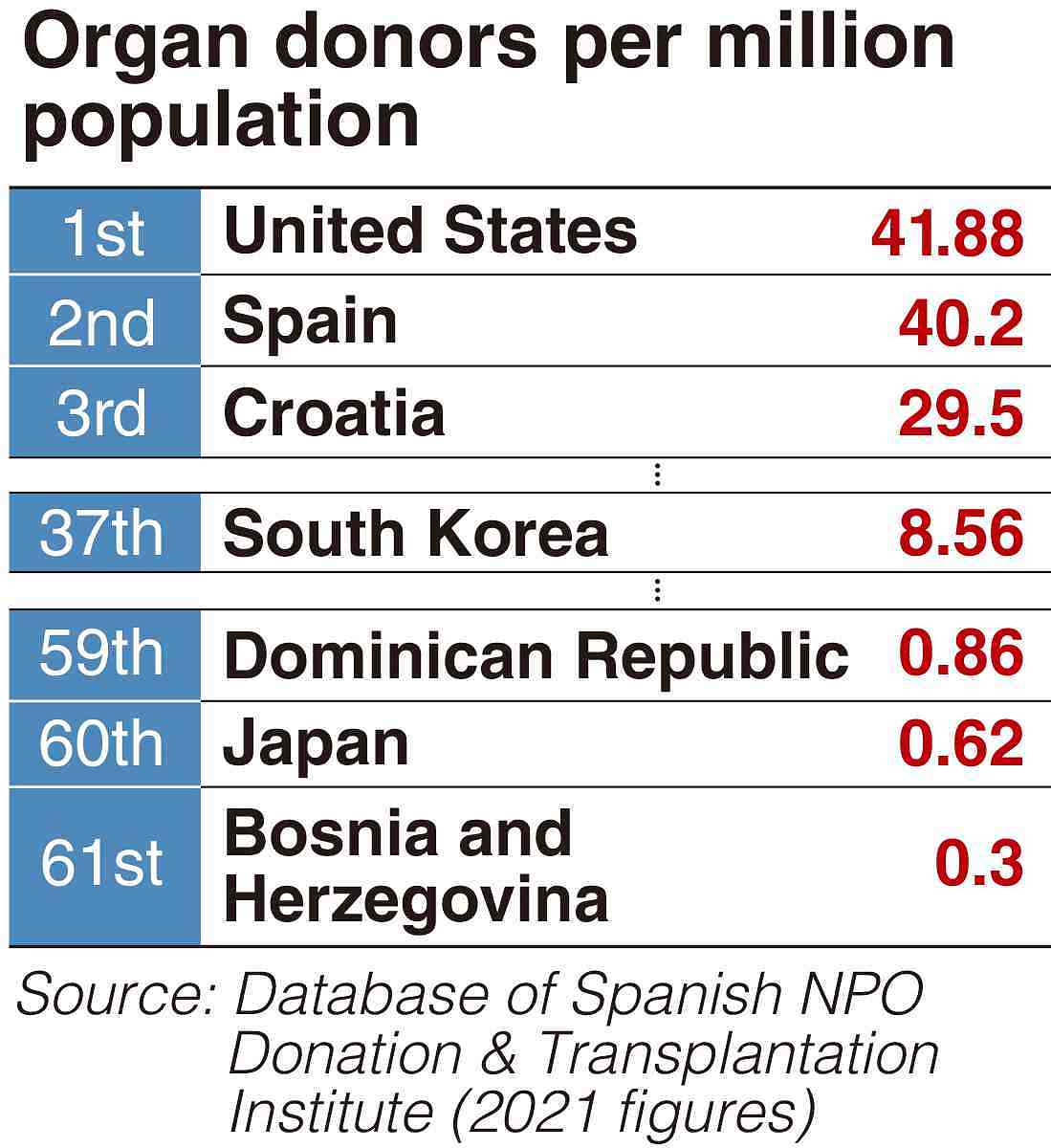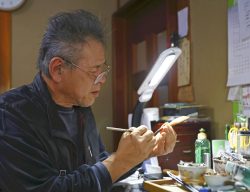
Haruki Fujiwara was 2 when he died in December 2021 while awaiting a heart transplant.
The Yomiuri Shimbun
16:15 JST, March 3, 2023
This is the third and final installment in a series looking into the organ transplant situation in Japan, including shadowy organ transplants overseas, the lack of legal oversight and the low number of organ donors.
***
Ken Fujiwara’s third son, Haruki, was 2 when he died of heart disease in December 2021, having waited in vain nearly two years for a heart transplant that never came because of lack of a donor.
“It’s so devastating,” said Fujiwara, 40, of Yamato, Kanagawa Prefecture. “Lives that could have been saved cannot be. A country like this is hopeless.”
The scarcity of donors in Japan has led to patients heading overseas for organ transplants through the mediation of groups like the Intractable Disease Patient Support Association, a Tokyo-based nonprofit organization.
According to the Japan Organ Transplant Network, 15,791 people were on waiting lists for organ transplants in Japan as of the end of January this year. The average waiting period is about three years for heart transplants and about 2½ years for lung transplants, while that for kidney transplants exceeds 14 years.
As for heart transplants for children under the age of 10, currently about 50 are on the waiting list. But in the 13 years since 2010, fewer than 30 operations have been performed.
It’s clear that Japan’s organ donation situation pales in comparison with the rest of the world. According to the database of the Spanish NPO Donation & Transplantation Institute, in 2021 the number of donors per million population was the highest in the United States at 41.88, followed by 40.2 in Spain. It was only 0.62 in Japan.

According to a survey taken that year by the Cabinet Office, only about 10% of people in Japan have declared an intent to donate their organs, while about 40% answered that they would like to donate.
“The people’s desire to be of use to others by donating their organs is not being fully realized,” said Hiroto Egawa, the president of the Japan Society for Transplantation. “This is a systemic error.”
How are other countries encouraging more organ donations?
South Korea in 2011 made it mandatory for medical institutions to report information on brain-dead patients to a state-designated organ transplant coordination organization.
Through the mandated reporting, the number of donors more than doubled from 268 in 2010 to 573 in 2016. The number of donors per million population in South Korea in 2021 was 8.56, or 14 times higher than that of Japan.
The United States has a similar mandate, which covers not only brain-dead patients but the deceased in general. A staff member of a government-certified organ transplant coordination organization will visit a hospital upon receiving a report and inform the patient’s family of their options for organ donation.
Howard Nathan, who served for many years as president of an organ donor coordination organization in the state of Pennsylvania, which in 1994 became one of the first U.S. states to adopt mandated reporting, said the number of donors increased by about 40% in three years since the start of the system.
In Japan, the Health, Labor and Welfare Ministry’s organ transplant committee has been discussing the introduction of mandated reporting, but no headway has been made on the issue. Among the concerns cited have been that “the burden will be even heavier for medical professionals on the front lines.”
In Japan, it is mainly the doctor in charge who informs the patient’s family of the option of organ donations. The psychological burden on the physician of explaining organ donations to the family of a patient who is about to die is heavy.
“The role of coordinators who are well-trained to deal with families is crucial,” said Beatriz Dominguez-Gil, director general of a Spanish organ transplant organization, known by its Spanish initials ONT.
How can Japan increase the number of domestic organ donors and eradicate unclear overseas operations? Needed first and foremost is a willingness by the government to review the relevant law and improve the situation.
Most Read
Popular articles in the past 24 hours
-

Seeking Nuclear Waste Site, Japan Eyes Remote Island of Minami-To...
-

Japan’s Govt Says No Immediate Impact on Oil Supply; No Releases ...
-

Japan Ministry Asks to Conduct Nuclear Waste Disposal-related Sur...
-

WBC to Begin: All the Pieces are in Place for Japan’s Second Stra...
-

Total Lunar Eclipse Visible for Some in Japan, While Clouds Block...
-

Tokyo High Court Upholds Unification Church Dissolution Order; Li...
-

Artisans from Disaster-Hit Areas Work Together to Keep Memories o...
-

Milano Cortina 2026: Ceremony for Winter Paralympic Torch Relay T...
Popular articles in the past week
-

Tokyo Spends Big on Children, Wins Over Parents
-

Japan’s Miura, Kihara Announce Withdrawal from Figure Skating Wor...
-

South Korea Tightens Rules on Foreigners Buying Homes in Seoul Me...
-

BOJ Keeping Eye on Economy and Takaichi's ‘Proactive Fiscal Polic...
-

Tokyo Measles Patient Traveled to Fukuoka Aboard JAL Planes; Susp...
-

Nidec Chairman Resigns Amid Accounting Scandal at Major Japanese ...
-

Strait of Hormuz Closure Shakes Markets; Prolonged Closure Could ...
-

Tourists Ignore Safety Barriers Near Famous Zao ‘Snow Monsters’ i...
Popular articles in the past month
-

Producer Behind Pop Group XG Arrested for Cocaine Possession
-

Japan PM Takaichi’s Cabinet Resigns en Masse
-

Man Infected with Measles Reportedly Dined at Restaurant in Tokyo...
-

Israeli Ambassador to Japan Speaks about Japan’s Role in the Reco...
-

Videos Plagiarized, Reposted with False Subtitles Claiming ‘Ryuky...
-

Prudential Life Insurance Plans to Fully Compensate for Damages C...
-

Woman with Measles Visited Hospital in Tokyo Multiple Times Befor...
-

iPS Treatments Pass Key Milestone, but Broader Applications Far f...
Top Articles in Society
-

Producer Behind Pop Group XG Arrested for Cocaine Possession
-

Man Infected with Measles Reportedly Dined at Restaurant in Tokyo Station
-

Woman with Measles Visited Hospital in Tokyo Multiple Times Before Being Diagnosed with Disease
-

Bus Carrying 40 Passengers Catches Fire on Chuo Expressway; All Evacuate Safely
-

Tokyo Skytree’s Elevator Stops, Trapping 20 People; All Rescued (Update 1)
JN ACCESS RANKING
-

Producer Behind Pop Group XG Arrested for Cocaine Possession
-

Japan PM Takaichi’s Cabinet Resigns en Masse
-

Man Infected with Measles Reportedly Dined at Restaurant in Tokyo Station
-

Israeli Ambassador to Japan Speaks about Japan’s Role in the Reconstruction of Gaza
-

Videos Plagiarized, Reposted with False Subtitles Claiming ‘Ryukyu Belongs to China’; Anti-China False Information Also Posted in Japan









